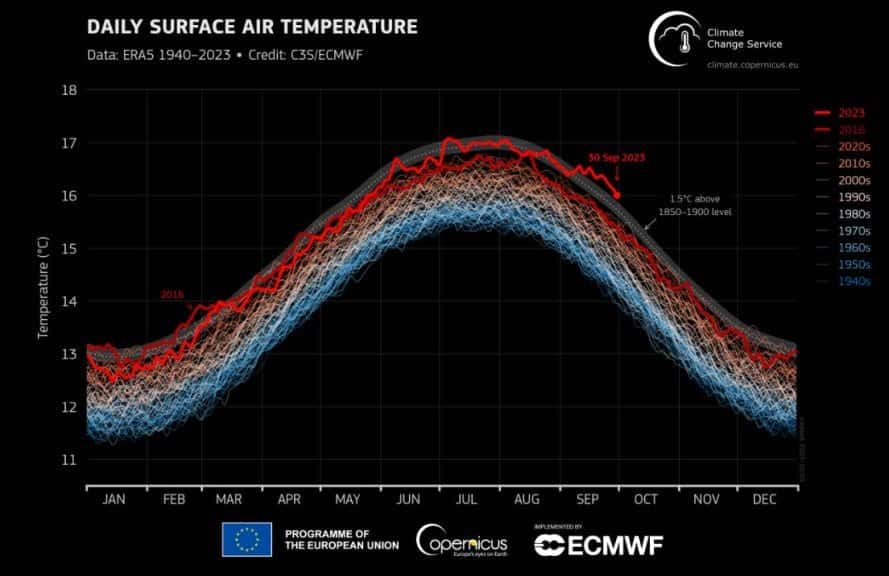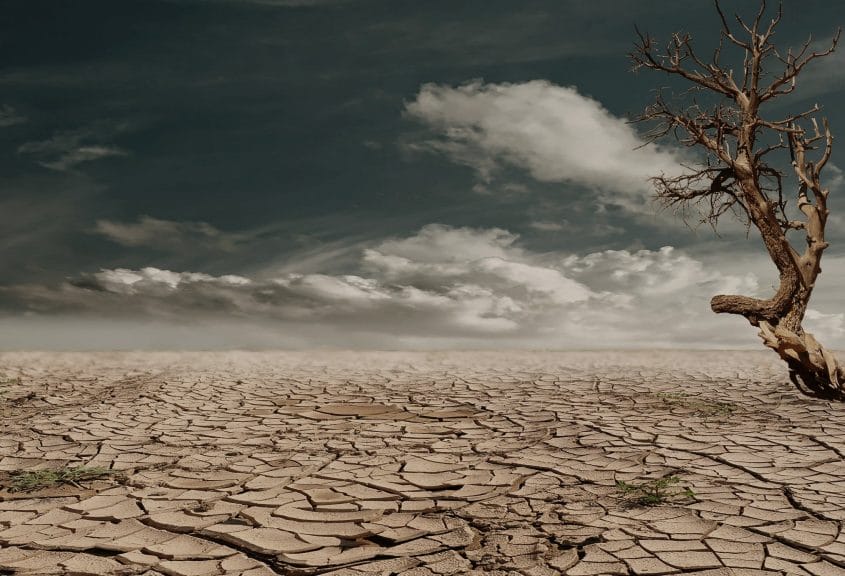European Union scientists have confirmed that 2023 will be the warmest year in recorded history.
The official declaration has come from Copernicus, a climate change service run by the EU. The global mean temperature so far this year has been 1.46 degrees above pre-industrial times (between 1850-1900).
The Copernicus Climate Change Service (C3S) published that November 2023 was the warmest November on record across the world. The average surface air temperature was 14.22°C, 0.85°C above the 1991-2020 average for the month. This was 0.32°C above the temperature of the second warmest November in 2020.
In addition, the average sea surface temperature over 60°S-60°N was the highest on record for November, 0.25°C warmer than the previous warmest November in 2015.
Each month since June has been the warmest on record this year, and the boreal autumn from September to November was 0.88°C warmer than average.
This data has come to light as leaders at the global climate conference, COP28 in Dubai, are working to keep the planet below the agreed 1.5 degrees of warming.
“2023 has now had six record-breaking months and two record-breaking seasons.” Samantha Burgess, Deputy Director of the Copernicus Service, explained. “The extraordinary global November temperatures, including two days warmer than 2°C above preindustrial, mean that 2023 is the warmest year in recorded history.”
Antarctic sea ice extent was the second lowest for November, at 9% below average, reaching record-low values for the time of year, and at the other pole, Arctic sea ice extent was at its eighth lowest value for November, at 4% below average.
C3S Director Carlo Buontempo said,
“As long as greenhouse gas concentrations keep rising, we can’t expect different outcomes from those seen this year… Reaching net zero as soon as possible is an effective way to manage our climate risks.”

What causes global warming?
The ‘greenhouse effect’ is warming resulting from gases in the Earth’s atmosphere trapping the sun’s heat, preventing it from returning to space. NASA describes four main gases contributing to this greenhouse effect: carbon dioxide, methane, nitrous oxide and chlorofluorocarbons (CFCs).
Carbon dioxide (CO2) has increased in atmospheric concentration largely due to coal and oil burning processes, which, as NASA describes, combine carbon with oxygen to create CO2. In addition, the European Commission states deforestation is a major factor in increased levels of CO2 as fewer trees are there to absorb the gas. A key point is that to stop global warming completely, CO2 emissions have to reach net zero worldwide.
Methane, another greenhouse gas, is produced from livestock farming – cows and sheep produce it in digestion. Methane is 80 times more potent at climate warming than carbon dioxide over a 20-year period, according to the UN Environment Programme.
Fluorinated gases are also emitted from equipment and products, such as air conditioning and aerosol sprays. The European Environment Agency describes ‘F-gases’ as powerful greenhouse gases ‘with an even higher warming potential than carbon dioxide.’
Global warming induced by humans is presently increasing at a rate of 0.2°C per decade, according to the European Commission. A 2°C increase compared to temperatures in pre-industrial times would be linked with ‘serious negative impacts to the natural environment and human health and wellbeing.’

What can we do about global warming?
Some key actions you can take at home were compiled by the United Nations, and they include reducing your energy consumption at home, including heating and cooling use. Switching to renewable-powered sources of energy, such as wind or solar, can reduce your carbon footprint.
Transport is another element to consider for lowering greenhouse gas emissions. We all know that reducing the number of flights you take will make a great difference – and swapping to traveling by train or bus is a more eco-friendly option.
About a third of all human-caused greenhouse gas emissions are linked to our food, according to the UN. The greatest proportion of this comes from agriculture, including methane from cattle digestion, nitrous oxide from fertilizers, and cutting down forests for land use (increasing levels of carbon dioxide).
In short, animal-based foods are generally associated with the highest greenhouse gas emissions. It is well-documented that shifting your diet towards a plant-based one can lead to a great reduction in greenhouse gas emissions. Why not try some vegan alternatives to your weekly staple meals?
Another key point is to spread awareness of our current climate crisis. Encourage other people you know to make a difference and support businesses’ use of plastic-free packaging and carbon-neutral or carbon-negative footprints.
Greta Thunberg once said, ‘You are never too small to make a difference.’ That is a key thing for us to remember, that every action you take towards helping the environment can lead to greater positive changes.














